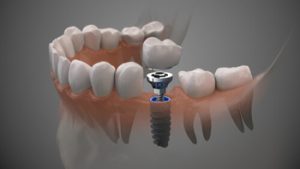Dental implants represent a cutting-edge solution for replacing missing teeth, providing a robust and aesthetically pleasing alternative to traditional dentures or bridges. However, the cost of dental implant treatment in Australia often prompts enquiries from prospective patients. This comprehensive guide offers a detailed dental implants’ price comparison, delving into the factors influencing the cost, the various types of dental implants available, and strategies to make the procedure more affordable.
Understanding Dental Implants
Dental implants are artificial tooth roots, typically composed of titanium, surgically implanted into the jawbone. They form a solid foundation for fixed or removable replacement teeth designed to blend with your natural teeth. Dental implants can replace single or multiple teeth, enhancing both functionality and aesthetics.
The Mechanism Of Dental Implants
 Grasping the mechanics of dental implants can demystify this prevalent dental procedure. The implant itself substitutes for the root of a missing tooth, with a crown placed on top of it to serve as the visible tooth. This integration ensures both stability and functionality, closely mimicking natural teeth.
Grasping the mechanics of dental implants can demystify this prevalent dental procedure. The implant itself substitutes for the root of a missing tooth, with a crown placed on top of it to serve as the visible tooth. This integration ensures both stability and functionality, closely mimicking natural teeth.
The Advantages Of Dental Implants
Dental implants offer a myriad of benefits over other tooth replacement methods. They look and feel like natural teeth, restore chewing ability, prevent bone loss, and do not compromise adjacent teeth. These advantages make dental implants a highly sought-after choice for many individuals.
Varieties Of Dental Implants
Several types of dental implants are tailored to different needs. Endosteal implants, the most common type, are inserted directly into the jawbone. Conversely, subperiosteal implants are positioned under the gum but above the jawbone, making them suitable for patients with insufficient bone height.
Why The Cost Of Dental Implants In Australia Seems High
The cost of dental implants in Australia can be higher compared to other countries, but this is due to several important factors that ensure patients receive high-quality care and long-lasting results.
High-Grade Materials
One primary reason for the higher cost of dental implants in Australia is the use of high-end materials. Titanium, commonly used for implants, is a biocompatible material that integrates well with the jawbone, ensuring long-term stability and durability.
Adherence To Stringent Quality Standards
Australian dental practices comply with rigorous quality standards set by regulatory bodies to ensure patients’ comfort. These standards necessitate using advanced technology and high-quality materials, contributing to the overall cost.
Experienced Dental Practitioners
The expertise of dental practitioners is a significant factor in the cost of dental implants. Australian dentists undergo extensive training and continuous education to deliver the highest possible standard of care. An appropriately qualified health practitioner ensures the integrity and accuracy of dental implant procedures.
Advanced Technological Integration
Modern dental clinics in Australia invest heavily in advanced technology to enhance dental implant procedures’ precision and success rates. This includes 3D imaging, computer-guided implant placement, and other state-of-the-art tools that, while beneficial, add to the cost.
Geographical Influences
The location of a dental clinic can influence the cost of dental implants. For instance, the cost of dental implants in Sydney might be higher compared to rural areas due to the higher overheads and demand in metropolitan regions.
Surgical Procedure
The surgical aspect of implant placement involves costs related to the complexity of the procedure and the use of anaesthesia. More complex cases requiring bone grafting or sinus lifts will naturally increase the cost.
Follow-Up Visits
Follow-up visits may be essential to observe the healing process and ensure the implant integrates properly with the jawbone. These visits may include adjustments and additional procedures, adding to the total cost.
Types Of Dental Implants And Their Associated Costs
Understanding how much dental implants cost according to the different types available in Australia can help you select the option that best suits your needs and budget.
Single Dental Implants
A single dental implant is used to replace one missing tooth. The overall single dental implant cost includes the implant itself, the abutment, and the dental crown. This option is ideal for patients who are missing one tooth and seeking a permanent restoration.
The cost of a single dental implant in Australia typically starts at 3,000 AUD. However, the exact cost can vary based on the complexity of the case and the materials used.
Full-Arch Dental Implants
Full-arch dental implants are designed for patients missing most or all of their teeth in one arch. This method uses just four implants to support a full arch of prosthetic teeth. Full-mouth dental implants are a cost-effective solution for extensive tooth loss, offering stability and aesthetics.
This type of dental implant can cost at least 17,000 AUD. However, the final cost depends on factors such as the need for additional procedures and the materials chosen for the prosthetic teeth.
The Dental Implant Process In Australia: What To Know
Understanding the various stages of the dental implant process can help you prepare and ensure a smooth experience.
Initial Consultation
The dental implant process begins with an initial consultation, where the dentist evaluates your oral health, bone density, and implant suitability. This consultation is crucial for developing a tailored treatment plan.
During the initial consultation, diagnostic tests such as X-rays or 3D scans are performed to assess the jawbone’s condition and plan the implant placement accurately. These tests are essential for ensuring the success of the implant procedure.
Implant Placement
During the implant placement procedure, the dentist surgically inserts the implants into the jawbone. This surgical or invasive procedure is performed under local anaesthesia, ensuring comfort and minimal pain. Recovery time varies, but patients may resume normal activities within a few days.
The implant placement procedure involves making a small incision in the gum to expose the jawbone, drilling a hole into the bone, and inserting the implant. This process is precise and requires the expertise of a skilled dental professional to ensure proper placement and integration.
Healing And Osseointegration
After implant placement, a healing period is necessary for osseointegration, where the implants fuse with the jawbone. This process can take several months but is essential for the stability and success of the dental implants.
During the healing period, patients are advised to maintain good oral hygiene and follow specific care instructions provided by their dentist. Regular follow-up visits may be scheduled to oversee the healing process and address any concerns.
Abutment Placement And Restoration
Once healing is complete, abutments are placed on the implants, followed by the attachment of dental crowns or prosthetic teeth. This final step restores function and aesthetics, providing a natural-looking smile.
The dental crowns or prosthetic teeth are customised to match your natural teeth’s colour, shape, and size. This ensures a neat and aesthetically pleasing result, enhancing both function and appearance.
Ways To Get Affordable Dental Implants In Australia
While dental implants can be a significant investment, there are ways to make the procedure more affordable without compromising quality.
Dental Insurance
Check to see if your dental insurance covers implant procedures. While not all policies include implants, some may offer partial coverage, reducing out-of-pocket expenses.
Reviewing your dental insurance policy and understanding the extent of coverage for implant procedures is essential. Some policies may cover diagnostic tests, implant placement, or prosthetic teeth, while others may only cover a portion of the overall cost.
Payment Plans
Many dental clinics offer payment plans, allowing you to spread the cost of the procedure over several months or years. This can make the treatment more manageable financially.
Payment plans can vary between dental clinics. Some may offer interest-free financing for a specified period, while others may require a down payment followed by monthly instalments. Discuss the available options with your dental clinic to find a plan that suits your budget.
Take Advantage Of Dental Clinic Offers
Many dental clinics offer promotions, discounts, or special packages to make dental implant procedures more affordable. These offers can significantly reduce the overall cost, making achieving your dental health goals easier without compromising quality.
For example, a package might include different types of scans at a discounted rate or for free compared to paying for each one separately. This can provide substantial savings and simplify the financial planning process.
Choosing The Right Dental Implant Clinic
Selecting the right dental implant clinic is crucial to ensuring a successful and satisfying dental implant experience. With numerous clinics offering dental implant services, it’s essential to distinguish those that provide outstanding care and great results. Here’s how to make an informed choice when selecting a dental implant clinic:
Check Online Reviews
Online reviews on platforms like Google can offer candid feedback from previous patients. Pay attention to comments about the clinic’s professionalism, cleanliness, and patient outcomes. Consistently positive reviews are a good indicator of a competent clinic.
Verify Credentials And Experience
 Ensure that the clinic’s dentists are appropriately qualified health professionals with extensive training in implant dentistry. Look for credentials like fellowships in professional organisations like the International Congress of Oral Implantologists (ICOI). Experienced dentists with a history of successful implant placements are more likely to provide optimal results.
Ensure that the clinic’s dentists are appropriately qualified health professionals with extensive training in implant dentistry. Look for credentials like fellowships in professional organisations like the International Congress of Oral Implantologists (ICOI). Experienced dentists with a history of successful implant placements are more likely to provide optimal results.
Evaluate Technology And Techniques
Modern dental technology plays a significant role in the success of dental implant procedures. Look for clinics that invest in state-of-the-art equipment, such as 3D imaging, computer-guided implant placement, and advanced diagnostic tools. These technologies enhance precision, reduce treatment times, and improve outcomes.
Assess The Treatment Plan
A reputable dental implant clinic should offer an initial consultation to evaluate your oral health, discuss your goals, and develop a distinctive treatment plan. This consultation is an opportunity to assess the dentist’s communication skills, their willingness to address your concerns, and the thoroughness of the proposed treatment plan.
Check Transparency In Pricing
Transparent pricing is essential to avoid hidden costs and unexpected expenses. The clinic should provide a detailed breakdown of the dental implant costs, including the initial consultation, diagnostic tests, implant placement, abutments, crowns, and follow-up visits. Ensure you understand what is included in the quoted price and ask about potential additional costs.
Evaluate Aftercare Services
The level of patient support and aftercare the clinic provides is crucial for a smooth recovery and the long-term durability of your dental implants. Look for clinics that offer comprehensive aftercare instructions, regular follow-up visits, and easy access to support if complications arise.
By carefully evaluating these factors, you can confidently choose a dental implant clinic that meets your needs and ensures a successful, satisfying dental implant experience.
Frequently Asked Questions
Are dental implants painful?
The dental implant procedure is performed under local anaesthesia, ensuring minimal pain during the surgery. Some discomfort and swelling are expected during the healing process, but these symptoms can be managed with pain medication and proper care.
How long do dental implants last?
With sufficient care, dental implants may last a lifetime. Regular dental check-ups and good oral hygiene practices are essential for maintaining this longevity.
Are there any risks associated with dental implants?
Like any surgical procedure, dental implants carry some risks, including infection, nerve damage, and implant failure. However, unlike cheap dental implants, the post-surgical risks of quality implants may be minimised when an experienced dental professional performs the procedure.
Can anyone get dental implants?
Most patients with good oral and general health can receive dental implants. However, certain conditions, such as uncontrolled diabetes or insufficient bone density, may require additional treatments or alternatives.
Ensuring Quality And Affordability In Dental Implants
 Dental implants offer a durable and aesthetically pleasing solution for missing teeth, enhancing both function and appearance. Understanding the costs and factors influencing the price of dental implants in Australia can help you make informed decisions about your oral health. While the investment may seem significant, the long-term benefits of dental implants make them a worthwhile consideration for many patients.
Dental implants offer a durable and aesthetically pleasing solution for missing teeth, enhancing both function and appearance. Understanding the costs and factors influencing the price of dental implants in Australia can help you make informed decisions about your oral health. While the investment may seem significant, the long-term benefits of dental implants make them a worthwhile consideration for many patients.
By exploring various options and considering factors such as dental insurance, payment plans, and the expertise of dental professionals, you can achieve a beautiful, functional smile with dental implants in Australia.
If you’re ready to take the next step towards a beautiful, confident smile, contact Beyond Infinity Dental today at (02) 8806 3799. Our dedicated team of dental professionals is here to provide personalised guidance, answer your questions, and help you explore the most suitable options for your dental implant needs.
Note: Any surgical or invasive procedure carries risks. Before proceeding, you should seek a second opinion from an appropriately qualified health practitioner.
Sources:
“Dental Implant Surgery.” Mayo Clinic, 29 Jan. 2019, www.mayoclinic.org/tests-procedures/dental-implant-surgery/about/pac-20384622. Accessed 29 July 2024.
“Dental Implants: What You Should Know.” U.S. Food And Drug Administration, 29 Oct. 2021, www.fda.gov/medical-devices/dental-devices/dental-implants-what-you-should-know. Accessed 29 July 2024.
“Full Mouth Dental Implants.” American Academy of Periodontology, 21 June 2019, www.perio.org/for-patients/periodontal-treatments-and-procedures/dental-implant-procedures/full-mouth-dental-implants. Accessed 29 July 2024.
HBF Health Insurance. “How to Afford the Cost of Dental Treatment in Australia.” HBF Health, 3 Jan. 2023, www.hbf.com.au/blog/how-to-afford-the-cost-of-dental-treatment-in-australia. Accessed 29 July 2024.
Howley, Elaine K., and Patric Cohen. “How to Find a Good Dentist.” US News & World Report, 20 Apr. 2022, health.usnews.com/health-care/patient-advice/articles/how-to-find-a-good-dentist. Accessed 29 July 2024.
“Policies, Codes, Guidelines and FAQ.” Dental Board AHPRA, www.dentalboard.gov.au/Codes-Guidelines.aspx. Accessed 29 July 2024.
Robinson, Kara Mayer. “Types of Dental Implants.” WebMD, 26 Apr. 2022, www.webmd.com/oral-health/types-dental-implants. Accessed 29 July 2024.









